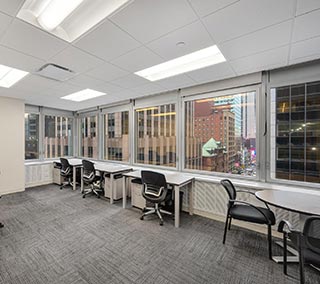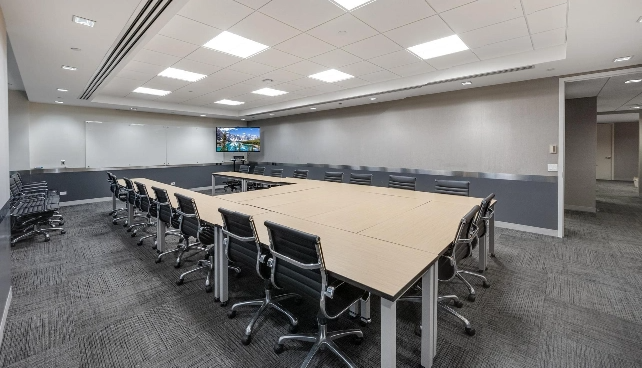The primary reason an attorney uses an office space is the cost. Lawyers are increasingly turning to shared office space as a way to manage their practice without the overhead costs of traditional office leasing.
Shared office spaces offer lawyers the flexibility and convenience they need to run their businesses while saving them money on rent and other expenses.
These offices provide access to amenities such as conference rooms, high-speed internet, printers/copiers, kitchen facilities, and more – all for a fraction of the cost of renting or buying an entire building.
Why Attorneys Choose Shared Office Spaces
Small law firms and solo attorneys can benefit from shared office space in a number of ways.
For starters, it’s an effective way to manage costs by paying only for the amount of office space they need at any given time. Using this strategy allows them to accommodate their needs as their business grows without paying for unused space.
Shared office space can also provide attorneys access to various amenities, such as meeting rooms, administrative support services, and other resources. Attorneys can maximize their productivity without additional staff or infrastructure costs.
These workspaces give attorneys the opportunity to network and collaborate with fellow professionals in their line of work. Networking is invaluable for building relationships, learning new skills, and developing a successful practice.
Overall, shared office space is an excellent option for small law firms and solo attorneys who want to keep their costs low while still enjoying the benefits of having a well-equipped workspace.
Open offices are also an excellent option for small law firms and solo attorneys who want a more collaborative atmosphere. These spaces provide an open-concept design that encourages collaboration and creativity while providing the privacy and quiet needed to get work done.
By taking advantage of shared office space, attorneys can stay focused on their practice without breaking the bank.
It’s More Cost Effective
Renting office space from a commercial landlord can be costly, especially for small law firms and solo attorneys. On top of the rent, there are additional expenses associated with utilities, janitorial services, and maintenance.
Shared office space provides a much more affordable option for lawyers looking to save money. In most cases, the cost of shared office space is less than renting from a commercial landlord, and the fees are often all-inclusive.
Now attorneys can budget for their business expenses and manage their finances efficiently.
In addition to being more cost-effective, shared office space also offers attorneys access to various amenities and services, such as paralegal support, that may not be available with traditional office leasing.
From conference rooms and high-speed internet to kitchen facilities and copiers, attorneys can enjoy the same amenities they would get from a commercial landlord – all for a fraction of the cost.
You’ll Get More Clients by Networking
Shared office space offers lawyers the opportunity to network and collaborate with fellow professionals in their line of work. Law firms are similar to other businesses.
They need sales. They need to build relationships, learn new skills, and develop a successful practice to achieve this goal.
When attorneys share an office space with other lawyers, they have the chance to connect with potential clients or referral sources who may not have been accessible otherwise.
Businesses and individuals are more likely to trust recommendations from other professionals they know, so having these connections can be extremely helpful in growing an attorney’s practice.
Shared office space also provides attorneys access to a variety of resources that may not have been available before. This includes legal databases, client management systems, and other tools that can help them improve the efficiency of their practice.
By taking advantage of shared office space, attorneys have the opportunity to create powerful networks and build a successful practice. By networking with other professionals, they can find lucrative client referrals and access resources to streamline their workflow – all without breaking the bank.
There’s a Social Element
One of the most overlooked benefits of shared office space is the social aspect. With solo attorneys and small law firms often working long hours alone, shared office space can provide them with an outlet to interact with other professionals in their field when they need a break or hit a snag.
By having a common workspace, attorneys can collaborate with others, share ideas, and get feedback on their work. The social element can help professionals stay motivated and inspired as they work toward the success of their practice.
Shared office space also offers attorneys a sense of community that would otherwise be missing if they worked alone in a remote office. The support and camaraderie of others in their field can make the work day more manageable and enjoyable.
Look for the Amenities You Need
From high-speed internet to kitchen facilities, shared office spaces offer services and resources that would otherwise be unavailable if you’re leasing an isolated office.
By taking advantage of these features, attorneys can stay focused on their practice without worrying about the high costs of traditional office leasing and mundane tasks like stocking kitchens and bathrooms with supplies.
They usually offer conference rooms and other areas that can be used for meetings or client consultations – things that would otherwise require an attorney to invest in additional space.
For Professionals, By Professionals
Sharing office space with other attorneys helps create a sense of professionalism that is essential to a successful practice.
Clients and potential referral sources are more likely to take an attorney seriously when they see they have their own dedicated workspace rather than working out of a home or coffee shop.
Furthermore, shared office spaces typically feature professional amenities such as a reception area, high-speed internet, and even administrative support staff. It’s possible your clients may be unable to tell you’re not working out of a traditional setting.
Opportunities for Collaboration
By networking with other lawyers, attorneys can increase their knowledge base and share ideas to help them improve their practice.
Being part of a shared office space allows attorneys to refer clients to each other or even team up on cases. Opportunities like this can be ideal for attorneys looking to grow their practice and increase their client base.
Who Should Use Shared Office Spaces?
Below is our list of legal professionals who will get the most out of these types of workspaces, though others may also receive great value.
The Transplant
Shared office space is also ideal for attorneys keen on moving to a new state and establishing their practice. By sharing office space with other lawyers, they can get to know the legal landscape of the area before investing in long-term leasing or buying a property.
It’s a strategy that allows them to test out different locations until they find the one that best suits their practice.
The Satellite
These workspaces are great for lawyers who want to open a satellite firm. By renting out desk space, they can set up a virtual law office in any location while still having access to the resources and amenities of traditional office leasing.
It provides attorneys with an affordable and flexible workspace that allows them to practice law without the high costs of leasing an entire office building.
How to Maintain Attorney-Client Privilege
While the benefits of shared office spaces are numerous, attorneys must take specific steps to protect the confidentiality of their clients. Since multiple lawyers will be sharing a workspace, there is an increased risk that sensitive client information could be compromised.
To ensure attorney-client privilege is maintained, attorneys should always use secure technology when conducting video conferencing and other online meetings. Furthermore, all shared office spaces should have designated areas for private conversations between attorneys and their clients so that sensitive information remains confidential.
In addition, attorneys must ensure that any administrative staff working in the space knows the importance of attorney-client privilege. Administrative staff should be trained to maintain confidentiality when dealing with any legal documents or other sensitive information.
Finally, attorneys should always be sure to notify their clients when they are working in a shared office space so that they can feel comfortable discussing confidential matters within the workspace.
Here are a few more tips to help you find the right workspace where you can have the most privacy and security for your practice:
Look for and Choose the Most Private Workspaces
When selecting a shared office space, attorneys should choose one with private offices or cubicles to conduct confidential meetings.
Communal workspaces may not provide the privacy necessary for attorneys to communicate with their clients safely and securely.
Due Diligence on Security Is a Must
Attorneys should also verify the security of their shared office space, such as ensuring that all documents are encrypted and backed up in a secure location.
Legal professionals should be aware of any potential risks to their client’s confidential information, such as insecure Wi-Fi networks or unsecured printers.
Tips for Working With Other Lawyers
Sharing office space with other lawyers has its own set of challenges. To ensure a smooth and professional working environment, attorneys should:
- Respect the privacy of others in the shared office space by only discussing confidential matters in designated areas or private offices.
- Make sure to notify other lawyers before making any changes to common areas or resources, such as office furniture or equipment.
- Respect the rules and regulations put in place by the shared office space provider, such as noise levels and use of common spaces.
- Be aware of potential conflicts of interest arising from working with other lawyers in a shared workspace.
- Develop professional relationships with other lawyers in the shared workspace to help create a collaborative and productive work environment.
FAQ
What are the benefits of shared office space?
The benefits of shared office space include cost savings, increased efficiency, and access to professional amenities such as meeting rooms and administrative staff.
Shared office spaces can also help attorneys create a network of peers that they can collaborate with on projects. They also provide a sense of community and support for lawyers who may not have easy access to other legal professionals.
What is a shared space office?
A shared space office is a workspace that is used by multiple individuals or businesses who share standard amenities and resources. Shared spaces often include private offices, meeting rooms, open workspaces, reception areas, and other amenities.
They are typically leased on a month-to-month basis and can accommodate a wide range of users, from solo practitioners to larger firms.
Looking for an office in the city? Corporate Suites offers furnished office spaces, virtual offices & conference rooms in several prestigious locations across New York City.






